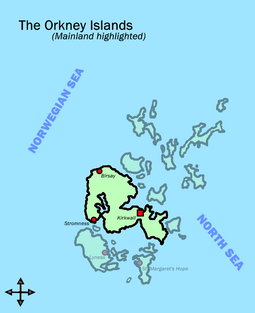Mainland, Orkney
| Gaelic name | Mòr-thìr |
|---|---|
| Norse name | Megenland/Hrossey |
| Meaning of name | Norse for 'mainland' or 'island of horses' |
 |
|
| Location | |
| OS grid reference | HY350158 |
| Physical geography | |
| Island group | Orkney |
| Area | 52,325 hectares (202 sq mi) |
| Area rank | 6 |
| Highest elevation | Mid Hill 271 metres (889 ft) |
| Administration | |
| Sovereign state | United Kingdom |
| Country | Scotland |
| Council area | Orkney Islands Council |
| Demographics | |
| Population | 17,162 |
| Population rank | 3 |
| Population density | 32.80 people/km2 |
| Largest settlement | Kirkwall |
| References | |
The Mainland is the main island of Orkney, Scotland. Both of Orkney's burghs, Kirkwall and Stromness, lie on the island, which is also the heart of Orkney's ferry and air connections.
Seventy-five per cent of Orkney's population live on the island, which is more densely populated than the other islands of the archipelago. The lengthy history of the island's occupation has provided numerous important archaeological sites and the sandstone bedrock provides a platform for fertile farmland. There is an abundance of wildlife, especially seabirds.
The name Mainland is a corruption of the Old Norse Meginland. Formerly the island was also known as Hrossey meaning "Horse Island". The island is sometimes referred to as "Pomona" (or "Pomonia"), a name that stems from a sixteenth-century mis-translation by George Buchanan and which has rarely been used locally, although it is retained in the name of the Pomona Inn at Finstown in the parish of Firth, as well as a local cafe in the capital of Kirkwall also known as the Pomona.
The island is relatively densely populated and has much fertile farmland. The bulk of the Mainland is west of Kirkwall and is low-lying, with coastal cliffs to the north and west and two sizeable bodies of freshwater, the lochs of Stenness and Harray.
The eastern part of the Mainland is shaped like the letter "W", the easternmost peninsula being known as Deerness. To the south, causeways called Churchill Barriers connect the island to Burray and South Ronaldsay via Lamb Holm and Glims Holm.
...
Wikipedia
